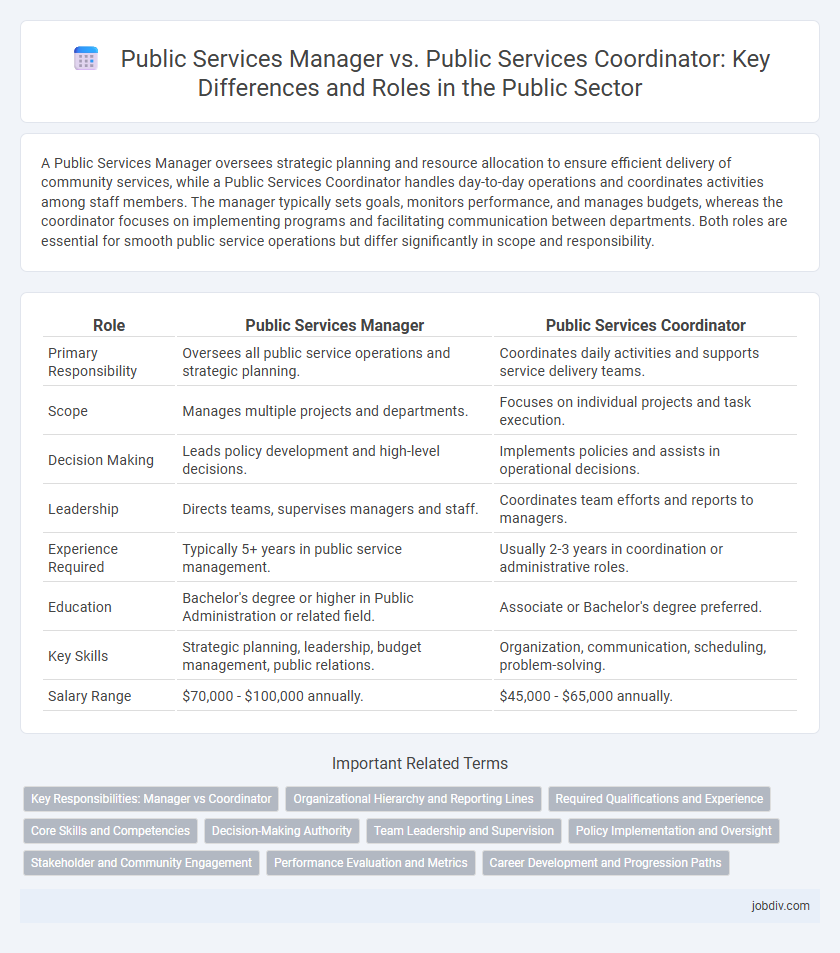A Public Services Manager oversees strategic planning and resource allocation to ensure efficient delivery of community services, while a Public Services Coordinator handles day-to-day operations and coordinates activities among staff members. The manager typically sets goals, monitors performance, and manages budgets, whereas the coordinator focuses on implementing programs and facilitating communication between departments. Both roles are essential for smooth public service operations but differ significantly in scope and responsibility.
Table of Comparison
| Role | Public Services Manager | Public Services Coordinator |
|---|---|---|
| Primary Responsibility | Oversees all public service operations and strategic planning. | Coordinates daily activities and supports service delivery teams. |
| Scope | Manages multiple projects and departments. | Focuses on individual projects and task execution. |
| Decision Making | Leads policy development and high-level decisions. | Implements policies and assists in operational decisions. |
| Leadership | Directs teams, supervises managers and staff. | Coordinates team efforts and reports to managers. |
| Experience Required | Typically 5+ years in public service management. | Usually 2-3 years in coordination or administrative roles. |
| Education | Bachelor's degree or higher in Public Administration or related field. | Associate or Bachelor's degree preferred. |
| Key Skills | Strategic planning, leadership, budget management, public relations. | Organization, communication, scheduling, problem-solving. |
| Salary Range | $70,000 - $100,000 annually. | $45,000 - $65,000 annually. |
Key Responsibilities: Manager vs Coordinator
Public Services Managers oversee strategic planning, resource allocation, and policy implementation to ensure efficient delivery of public services, often managing teams and budgets at a higher organizational level. Public Services Coordinators focus on operational tasks such as scheduling, coordinating staff activities, and handling day-to-day service logistics to support effective service provision. The Manager role emphasizes leadership and decision-making authority, while the Coordinator role centers on tactical execution and administrative support within public service departments.
Organizational Hierarchy and Reporting Lines
A Public Services Manager typically holds a higher position in the organizational hierarchy than a Public Services Coordinator, overseeing broader departmental functions and strategic initiatives. Managers report directly to senior leadership, such as directors or department heads, while coordinators generally report to managers or assistant managers, handling day-to-day operational tasks. This clear hierarchy ensures effective communication and accountability within public service organizations.
Required Qualifications and Experience
Public Services Managers typically require a bachelor's degree in public administration, social work, or a related field, along with several years of experience in managing public programs or teams. Public Services Coordinators often need an associate's or bachelor's degree combined with experience in program coordination, community outreach, or administrative support within public service contexts. Both roles demand strong organizational skills and knowledge of public sector policies, but managers usually have advanced leadership responsibilities and project management experience.
Core Skills and Competencies
Public Services Managers excel in strategic planning, leadership, and resource allocation to effectively oversee community programs and staff operations. Public Services Coordinators specialize in communication, scheduling, and client relationship management to ensure seamless service delivery and support. Both roles require strong problem-solving abilities, organizational skills, and a commitment to public engagement but differ in scope and decision-making responsibilities.
Decision-Making Authority
Public Services Managers typically hold higher decision-making authority, overseeing service delivery strategies, resource allocation, and policy implementation within public agencies. Public Services Coordinators generally manage day-to-day operations, support staff coordination, and assist in implementing decisions made by managers without possessing comprehensive decision-making power. The managerial role demands strategic planning and accountability, whereas the coordinator role centers on operational support and communication facilitation.
Team Leadership and Supervision
Public Services Managers hold primary responsibility for strategic team leadership and comprehensive supervision, including performance management, staff development, and resource allocation. Public Services Coordinators typically operate under managerial direction, focusing on day-to-day team coordination, task delegation, and ensuring smooth workflow among front-line personnel. The managerial role demands higher-level decision-making authority and accountability for team outcomes compared to the coordinator's operational support functions.
Policy Implementation and Oversight
Public Services Managers are responsible for developing and overseeing the implementation of public policies, ensuring compliance with regulations and strategic goals. Public Services Coordinators focus on coordinating day-to-day activities that support policy execution, acting as liaisons between management and staff. Both roles require strong knowledge of public administration, but managers prioritize policy development and oversight while coordinators emphasize operational support and communication.
Stakeholder and Community Engagement
Public Services Managers lead strategic planning and decision-making to enhance stakeholder relationships and community engagement, ensuring effective service delivery aligned with public needs. Public Services Coordinators focus on facilitating communication and coordination among stakeholders, organizing community events, and supporting engagement initiatives to promote active participation. Both roles prioritize building trust and collaboration with community members and stakeholders to improve public service outcomes.
Performance Evaluation and Metrics
Public Services Managers oversee comprehensive performance evaluation systems, employing key metrics such as service delivery times, community satisfaction rates, and resource allocation efficiency to ensure optimal department functioning. Public Services Coordinators focus on monitoring operational metrics like task completion rates, client interaction quality, and adherence to service standards to support frontline team performance. Both roles utilize data-driven strategies for continuous improvement, with managers emphasizing strategic analysis and coordinators targeting day-to-day performance metrics.
Career Development and Progression Paths
Public Services Managers typically oversee multiple projects and teams, demonstrating leadership skills essential for advancing to senior management roles in government or nonprofit sectors. Public Services Coordinators often focus on day-to-day operational tasks and program implementation, providing foundational experience for transitioning into managerial positions. Career progression for coordinators generally involves gaining specialized knowledge and project management expertise, while managers enhance strategic planning and policy development capabilities to reach executive levels.
Public Services Manager vs Public Services Coordinator Infographic

 jobdiv.com
jobdiv.com